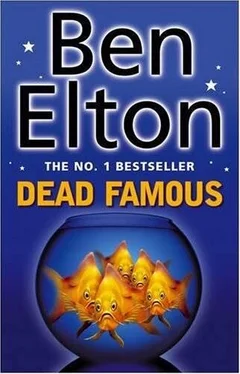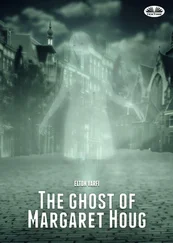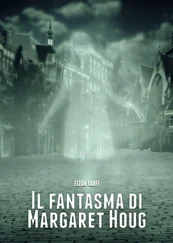Under normal circumstances Thursday should have meant another round of eviction nominations, but because of Woggle’s unexpected departure it was announced that the evictions for that week would be cancelled and that things would be picked up as normal on the following Thursday. If ever there was an excuse for a party, this surely had to be it.
DAY THIRTY-SIX. 1.00 p.m.
Coleridge had spent another fruitless morning out at Shepperton Studios wandering around the replica Peeping Tom house, foraging in his imagination for some stroke of insight that might lead on to a theory.
Something was forming in his mind, the beginnings of an idea, but it was just a theory. There was nothing much so far to back it up. Still, better to be chewing on something rather than nothing, even if it did prove to be a red herring in the end. He returned to the station to find a faxed letter from the Irish Garda waiting for him. It was in response to an inquiry he had made to them about Ballymagoon, the village which Coleridge had heard mentioned on the radio and which was at the centre of an economic slump in rural Ireland. Dervla’s home village.
Suspect family still resident in village, the letter read. Both parents and two younger sisters continue to live at family home. Family do not appear to have escaped effects of slump. Considerable financial hardship, car sold, negative equity on house and farm, mounting debts. Recent request for loans denied.
Well, thought Coleridge, if ever a girl had a pressing reason for wanting to win half a million pounds it was Dervla. On the other hand, he knew from many years of experience that when it came to money most people did not need a pressing reason to covet half a million pounds.
Nonetheless, her parents were in danger of losing their farm. And volunteering to be on House Arrest was quite a strange choice for a girl like Dervla to make. Of all of the housemates, she was undoubtedly the most… Coleridge struggled for the word… “beautiful” sprang into his mind, but he fought it out again. Finally he settled upon “different.” Dervla was the most different.
There was no doubt about it that, as motives went, money was always a good one. Coupled with imminent family shame it was terrific… Except killing one housemate was scarcely going to guarantee her victory. It was only week four, there were seven other competitors, and it seemed unlikely that she had been planning to kill them all.
She could not even have known that she was a popular housemate. None of them knew anything about what the world was thinking.
Something to save for later was about all Coleridge could construe from his fax from the Irish police. He put it in the Dervla file and asked a constable to add a “motive” note to her photograph on the wall map. Then he joined Trisha and Hooper at their habitual position in front of the video screen.
They were looking at day eighteen.
“Look at all that booze. Must be over a hundred quid’s worth,” said Trisha.
“It was the only way to get things going,” Hooper replied. “Geraldine Hennessy said as much to the press at the time.”
“Surely these people must have realized that they were being manipulated?” Coleridge observed. “Getting them drunk is such a transparent ploy.”
“ Of course they realized it, sir, but you have to try and understand that they’re not like you. They don’t mind . And frankly if I was stuck in a sealed house with David and his guitar for weeks on end and somebody stuck five crates of booze on the table, I’d get stuck in myself.”
“But have they no sense of personal privacy? Dignity?”
Hooper could disguise his exasperation no longer. “Well, sir, being as how they’ve all volunteered to be on the programme and they’ve been wandering around in their knickers ever since, I would say that the answer to that would probably have to be no.”
“Don’t take that tone with me, sergeant.”
“What tone, sir?”
“You know damn well what tone.”
“I do not know what tone.”
“Well, don’t take it anyway.”
On the screen, while the other housemates began their evening’s drinking, Moon got up and made her way to the confession box. “I just wanted to say… that I’ve been thinking about the trick I played on Sally and the girls the other night, you know, when I said all that stuff about being abused and institutionalized…”
Moon then went into a lengthy ramble about herself and what a mad-for-it gangster she was, a straight-talker who just said what she felt like and at the end of the day people would have to take her as they found her. Finally, she got to the apology.
“What I’m saying is, I don’t want people to think it was cruel and the like, especially ’cos I could hear her sobbing afterwards and all that, and I expect the public could too. Even though if you ask me it was a bit of an over-reaction… but what I’m saying is, if Sally’s been abused or whatever and has got, you know, mental health stuff going on or whatever, then fair play to her, right, because at the end of the day I wouldn’t like it myself if I thought someone was taking the piss out of me for being a nutter, particularly if I actually was a nutter, like Sally seems to be, although I’m not saying she is, if you know what I’m saying? So that’s all I’m saying, right. If you know what I’m saying.”
All of this was news to Coleridge. Geraldine had never broadcast the original discussion that had taken place in the girls’ bedroom; nor had she broadcast Moon’s apology in the confession box.
“Sally has ‘mental health’ stuff going on?” Coleridge asked.
“It seems so,” said Trish, ejecting the Moon confession tape.
“I talked to Fogarty the Editor, and he told me that Sally pretty much said as much one night when the girls were chatting. They never broadcast it but Geri the Gaoler kept the tape for possible future use. That’s why we didn’t see it in our first trawl, it was still hidden on the edit suite hard disk. Fogarty sent it over. This is it.”
And so Coleridge, Hooper and Trish listened in on the conversation that had taken place in the girls’ room on the eighth night when Moon had lied about her past and Sally had shown herself so sensitive about the subject of mental health. For all three of them watching, one phrase stood out above all the others. Something that Sally had said as she sat there in the dark, her voice shaking with emotion.
“… when once in a blue moon something happens, like some poor schizo who never should have been returned to the community gets stuck inside their own dark box and sticks a knife in someone’s head or whatever, suddenly every mild depressive in the country is a murderer.”
Trisha had marked down the time code of the comment and now they rewound the tape and listened to it again.
“Sticks a knife in someone’s head.”
“Sticks a knife in someone’s head.”
With the knowledge of hindsight, it was certainly an unfortunate choice of words.
“Coincidence, do you think?” Coleridge said.
“Probably. I mean, if Sally was the murderer, how would she have known nearly four weeks beforehand how she was going to do it? We’ve already established that the murder was an improvisation.”
“We haven’t established anything of the sort, constable,” Coleridge snapped. “We have supposed such a thing because it seems difficult to see how it could have been planned. However, if someone in the house had an attraction for knives, if one of them was mentally predisposed towards stabbing, then we might suppose that this would make the murder method less a matter of chance and more one of inevitability.”
Читать дальше












